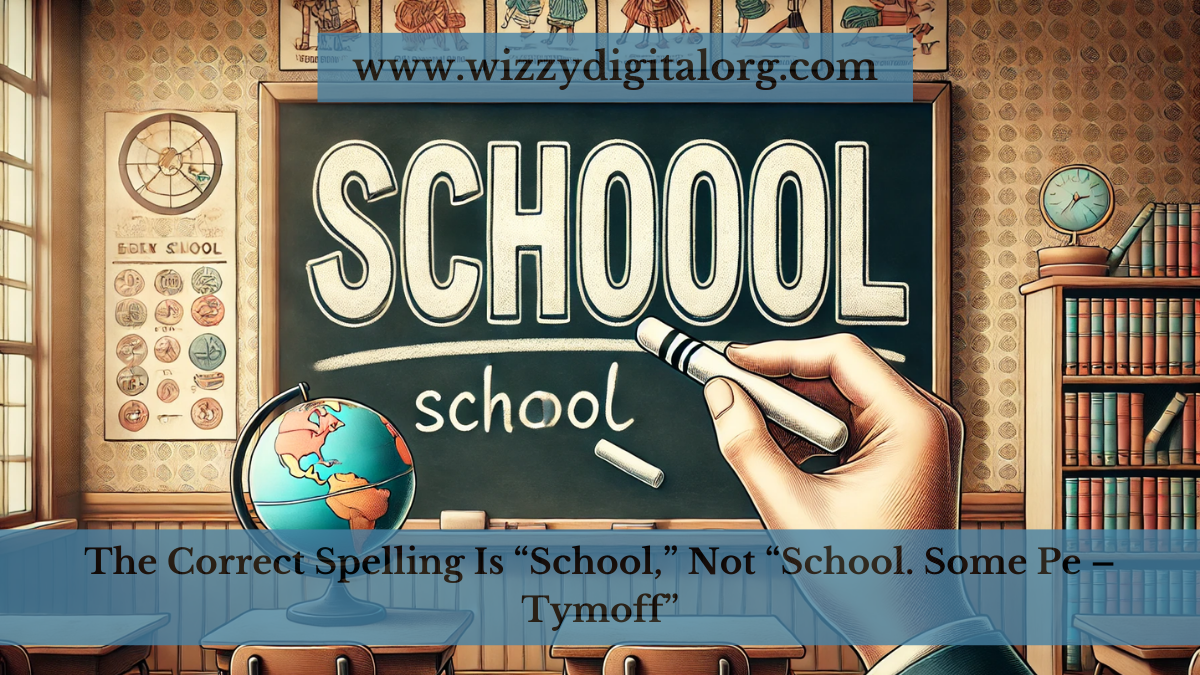The Correct Spelling Is School Not School. Some Pe – Tymoff
In our world of quick texts, autocorrect, and social media, spelling is something we often overlook. Yet, spelling remains a fundamental aspect of communication.
The phrase “The correct spelling is school not school. Some pe – tymoff” humorously emphasizes the importance of accurate spelling, even with familiar words.
This article dives deep into the humorous yet insightful phrase, “The correct spelling is school not school. Some pe – tymoff,” which hints at the significance of spelling even the most basic words correctly.
Introduction: What’s Behind This Phrase?
The phrase “The correct spelling is school not school. Some pe – tymoff” might sound a bit confusing at first glance. It’s a humorous expression meant to remind people about the importance of correct spelling, even for basic words. It’s particularly relevant in a time when people, especially online, may type quickly without double-checking.
Breaking Down the Meaning
At its core, the phrase serves as a simple reminder about spelling. By pointing out the correct spelling of a well-known word like “school,” it suggests that no word is too simple to be misspelled. The typo “pe” likely stands for “people,” symbolizing anyone who may be prone to misspellings.
Importance of Spelling in Communication
Spelling is one of the primary building blocks of written communication. Correct spelling:
- Enhances Clarity: Readers quickly understand the intended message without getting distracted.
- Establishes Credibility: Proper spelling demonstrates professionalism and attention to detail.
- Prevents Miscommunication: Incorrect spelling can lead to misunderstandings or confusion.
Historical Background of the Word “School”
The English word “school” originates from the Greek word scholé, meaning “leisure” or “learning.” Over centuries, this term evolved to represent a place of learning. This evolution reflects how language and spelling adapt over time but retain core meanings that add depth to our communication.
Common Misspellings and Their Consequences
Even simple words like “school” can be misspelled. Common errors such as “schoool” or “scool” often occur due to:
- Typing too quickly
- Relying too heavily on autocorrect
- A lack of focus on spelling in informal communication
Each misspelling, though minor, can affect the reader’s perception of the writer’s credibility and professionalism.
Digital Age and the Role of Autocorrect
In the digital era, we rely on autocorrect tools to catch spelling errors. While autocorrect is helpful, it can’t replace the necessity for a basic understanding of spelling. Learning proper spelling helps in situations where technology might fail or misinterpret what we intended to write.
Autocorrect and Its Limitations
Autocorrect is often limited to phonetic similarity, which might not always capture the intended word. Common examples include:
- “Their” and “there”
- “Loose” and “lose”
- “School” and “schol”
Spelling Errors in Social Media and Its Impact on Perception
Social media is where language often becomes informal, leading to increased misspellings. These minor errors can have larger implications:
- Perceived Lack of Professionalism: Employers or colleagues might view consistent spelling errors as unprofessional.
- Impact on Credibility: Followers may take content less seriously if they spot multiple spelling mistakes.
Grammar and Spelling in Education
Teaching correct spelling in school is crucial. However, with the rise of technology, schools face the challenge of balancing traditional spelling lessons with modern tools. Emphasizing the correct spelling of common words, like “school,” builds a foundation that benefits students throughout life.
Humor and Learning: How Lighthearted Phrases Aid Education
Humor can make learning more engaging. Light-hearted phrases like “The correct spelling is school not school. Some pe – tymoff” attract attention because they sound funny but highlight the importance of spelling. This technique is often used in educational settings to encourage students to remember basic rules.
FAQs: Clearing Up Common Questions
1. What does “The correct spelling is school not school. Some pe – tymoff” mean?
It’s a humorous phrase pointing out the importance of spelling the word “school” correctly, reminding people that even simple words need attention.
2. Why is correct spelling important in communication?
Correct spelling ensures clarity, builds credibility, and prevents miscommunication, especially in professional settings.
3. Does autocorrect fully replace the need for learning spelling?
No, autocorrect is a helpful tool, but understanding basic spelling rules is still essential as technology can misinterpret intent.
4. How can humorous phrases help with learning spelling?
Humor makes learning enjoyable and memorable, helping people recall correct spelling more effectively.
5. Is it okay to misspell words on social media?
While informal platforms are more lenient, consistently misspelling words can affect one’s credibility and professional image.






